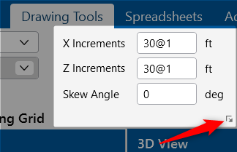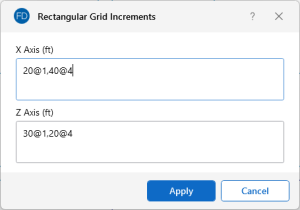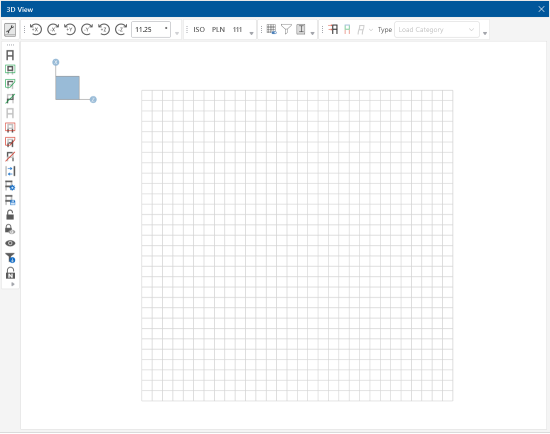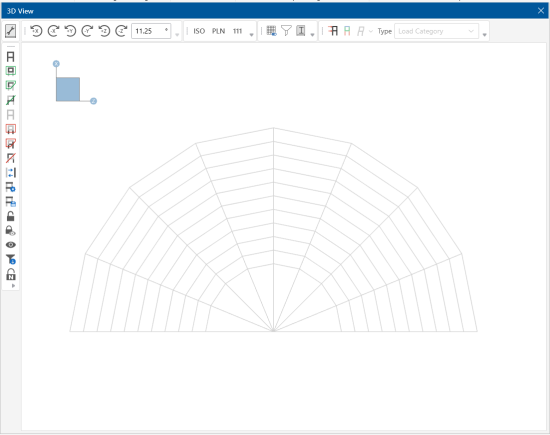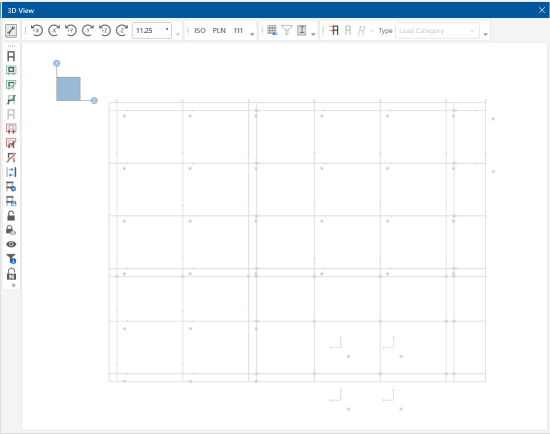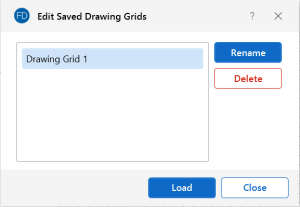Drawing Grid
The Drawing Grid is a tool that helps you draw new beams, slabs and footings in the model view. This grid is independent of the model, so you may change the grid as you build your model without changing any modeling that you have completed. This is because as you draw the beams, slabs and footings, the joints used to define them are created automatically. These joints remain in their locations if the grid is relocated.
Drawing Grid Features
The Drawing Grid tools can be found on the Drawing Tools ribbon. These features allow you to define, save and reuse rectangular, radial and DXF underlay drawing grids. You can also set a specific grid as your default.
Click on image to enlarge it
To use the Drawing Grid features refer to the following table and sections.
Drawing Grid Features
|
Feature |
Description |
|---|---|
|
Drawing Grid section |
|
|
|
The Display Grid icon lets you turn on (show) or off (hide) the drawing grid in the current model.
For more information, see Show / Hide the Drawing Grid. |
|
Type |
The Type feature lets you choose between a rectangular drawing grid, radial drawing grid or DXF underlay. |
|
Color |
The Color feature lets you choose what color you would like the drawing grid lines displayed in. |
|
X Increments |
The X Increments input lets you set the number of and width between the drawing grid lines. |
|
Z Increments |
The Z Increments input lets you set the number of and height between the drawing grid lines. |
|
Skew Angle |
The Skew Angle input lets you skew the drawing grid perpendicular to the global axis plane. |
|
The icon located to the bottom-right of the Skew Angle feature lets you open the Rectangular Grid Increments window. Click on image to enlarge it The Rectangular Grid Increments window lets you enter more X and Z incremental values. |
|
|
Drawing Grid Origin section |
|
|
X |
The X grid origin lets you set the increment for the X direction. For more information, see Rectangular Drawing Grid. |
|
Z |
The Z grid origin lets you set the increment for the Z direction. For more information, see Rectangular Drawing Grid. |
|
|
The Click to Locate icon lets you specify or relocate the origin of the drawing grid. For more information, see Relocating the Drawing Grid. |
|
Save and Recall features section |
|
|
|
The Save as Default feature lets you save any of the grid information as the default settings so that when you start a new model, that information is already there. For more information, see Save a Drawing Grid Default. |
|
|
The Save Grid feature lets you save a drawing grid so you can recall it for later use. Saved drawing grids are model independent, i.e. when you save a grid, you can reuse it in any other model you are working with in the future. For more information, see Save a Drawing Grid. |
|
|
The Load Grid feature lets you recall a saved drawing grid. For more information, see Recall a Drawing Grid. |
Show / Hide the Drawing Grid
The Drawing Tools ribbon includes a toggle that allows you to show or hide the drawing grid in the current model.
To show or hide the drawing grid:
-
Open to the Drawing Tools ribbon.
-
Click on the Display Grid icon.
Click on image to enlarge it
-
When the Display Grid slider is blue, it indicates that the drawing grid is turned "on" (shown).
-
When the Display Grid slider is gray, the drawing grid turned "off" (hidden).
-
Drawing Grid Type
Rectangular Drawing Grid
The rectangular drawing grid is defined by increments in two directions. The X and Z Origins are where you want the grid increments to start. The X and Z Increments are the distances between the grid points or lines in two global directions.
Click on image to enlarge it
You may use symbols such as "@", "/" and "," when entering the drawing grid increments.
-
The "@" entry may be used to specify multiple, equally spaced, grid increments.
For example, if you wanted 7 increments at 10 units each, you would type "7@10" in the increment field.
-
The "/" entry subdivides a larger increment into smaller equal increments.
For example, the entry "12/4" would create 4 increments of 3 units each.
-
Use commas (",") to enter multiple increments in the increment field.
For example, if you wanted to define increments of 3, 4, 7 and 2 units, you could enter "3,4,7,2" in the increment field.
Once the drawing grid is specified and displayed in the model view, it provides snap points while drawing your model.
Radial Drawing Grid
Increments in two polar directions define a radial drawing grid. The Drawing Grid Origin is the point about which the grid will rotate. The default is at the global origin (0,0,0). The Start Angle defines the angle from the global axis that the first spoke will be drawn. The Angle Increment controls the number and angular spacing of the spokes in the grid. The Radial Increments controls the number and location of the rings in the grid.
Click on image to enlarge it
DXF Underlay Grid
This type should only be chosen when you want to import a DXF Grid from a DXF file. The following is an example of an imported DXF file underlay grid. For more information, see Import DXF Grid.
Click on image to enlarge it
Relocating the Drawing Grid
The origin of the drawing grid may be specified in two ways. The first is to enter the exact global coordinates for the origin. This can be done by entering the values in the X Origin and Z Origin boxes. The second option is to specify the origin by clicking on an existing point in the model. This option is available by clicking the Click to Locate button, and then clicking on the specific location in the model view where you wish the drawing grid origin to be located. The drawing grid origin is then moved to this point.
Skewed Drawing Grid
The rectangular drawing grid can be skewed by specifying a skew angle. This option is available in the Drawing Grid Section section of the Drawing tools ribbon. This skew angle allows for the creation of a regular rectangular drawing grid, but displayed in the model view at the specified angle, inclined from the global axis.
Save a Drawing Grid Default
You may save any of the grid information as the default setting so that when you start a new model, that information is already there.
To save a drawing grid as the default:
-
In the Drawing Grid and Drawing Grid Origin sections of the Drawing Tools ribbon, enter the information that you want to save.
-
Click on
 Save as Default in the Drawing Tools ribbon.
Save as Default in the Drawing Tools ribbon.
Save a Drawing Grid
To save a drawing grid:
-
In the Drawing Grid and Drawing Grid Origin sections of the Drawing Tools ribbon, enter the information that you want to save.
-
After defining the grid, click on
 Save Grid in the Drawing Tools ribbon.
Save Grid in the Drawing Tools ribbon.You are prompted for a name for the drawing grid. Once you provide a name, the drawing grid is saved and added to the list of grids available for recall.
Recall a Drawing Grid
To recall a previously defined drawing grid:
-
Click on
 Load Grid in the Drawing Tools ribbon.
Load Grid in the Drawing Tools ribbon.The Edit Saved Drawing Grids window opens.
Click on image to enlarge it
-
Click on the drawing grid you want.
-
Click the Load button.

